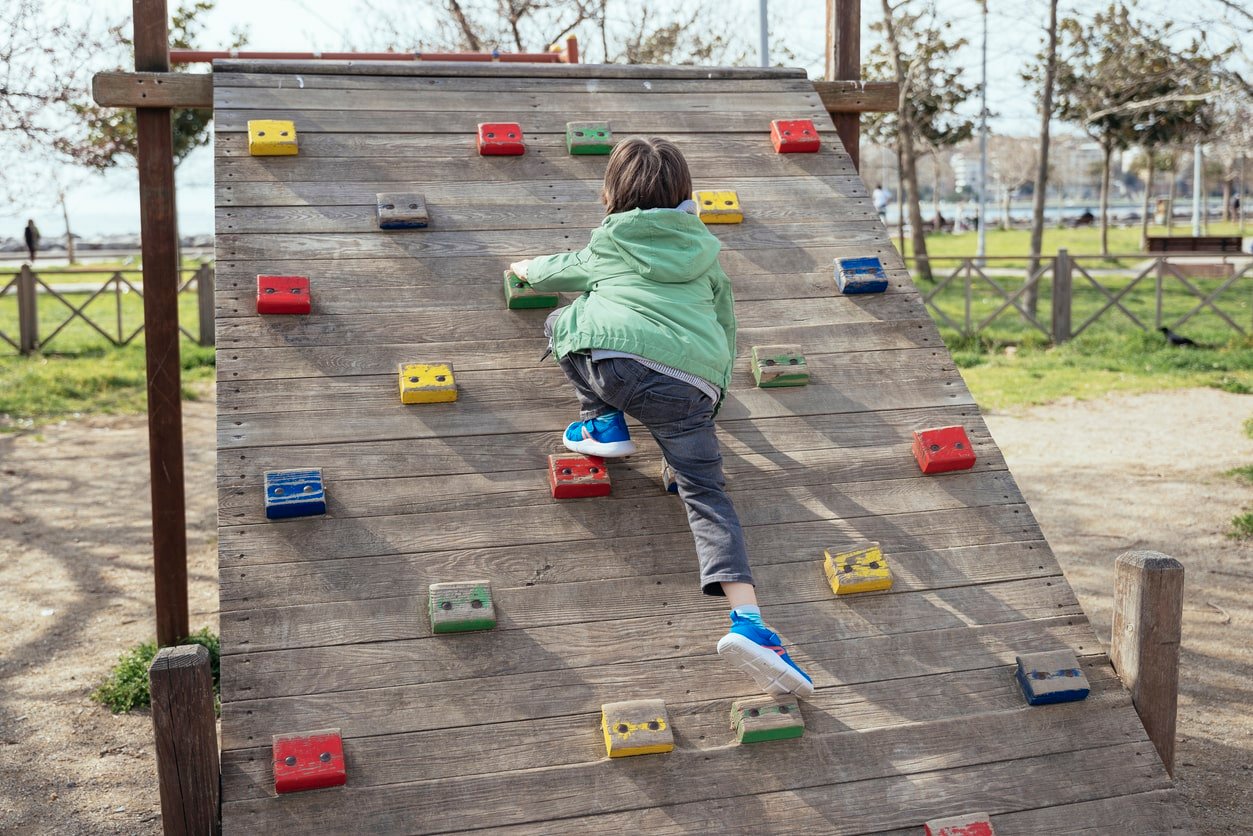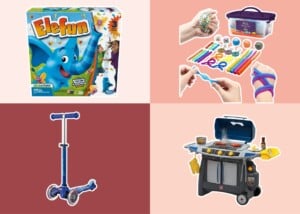“I can’t do it mommy!” When my child was a toddler, she used this phrase . . . a lot. Our tiny humans are grappling with learning (and perfecting) many new tasks. However, they don’t always know how to persevere because they lack the resilience and practical skills to dust themselves off and try again. Does your child also give up on new or challenging tasks too easily instead of sticking with them? While this is normal, it’s also important to consider how we can raise our little ones to persist and persevere to improve their overall well-being and future outcomes. In this article, we’ll explore what it means to persist vs. persevere, discuss potential barriers to persistence for toddlers, and share examples of perseverance activities for kids.
What Is Persistence?
As I mentioned, things can get pretty tough for our little ones. They’re constantly learning and growing, which means they’re also faced with challenges — new or tricky tasks they must practice over (and over!) again until they can do them easily. Being able to keep going, trying, and overcoming obstacles is called persistence.1 It plays an important role in our children’s development and future success.
It’s also important to understand the difference between “persevere” vs. “persist,” as these are closely related ideas. Perseverance is being able to stick to your goals, no matter what. It doesn’t matter if things get tough; if you persevere, you’re good at sticking with it for the long haul.1 Meanwhile, persistence is about keeping at something, showing ongoing effort, and not giving up too easily.2 These things sound similar, but perseverance is more about long-term efforts (marathon), and persistence is about being strong from day to day (sprint).
Why Is Persistence Important for Kids?
Let’s be frank — in life, sometimes there can only be one winner. Or we need to practice and stick to something before we get good at it. Although we never want our children to be disappointed, experience the sting of failure, or be distressed, they’ll experience these feelings or situations at some point. This means they must learn how to persevere, keep going, dust themselves off, and try again.
Learning how to persevere can support our children’s development and well-being in many ways:1,2,3
- Improved resilience and mental well-being: Being able to persevere helps children cope with stressful events and adversity. This builds resilience (their ability to bounce back after challenges), which supports overall mental well-being.
- Improved confidence and self-esteem: Children see they’re capable, learn how to problem-solve, and improve their skills. All these things help improve their self-confidence and self-esteem.
- Innovation: Children who can persevere get creative, as they’re capable of exploring new ideas or finding innovative ways to solve problems.
- Better long-term outcomes: Our achievements most often come after a lot of hard work and persistence. So, when children learn how to persevere, they’re more likely to experience success and achievement in the future (for example, in education or finances). They can see the long game, keep pushing to meet their goal, and navigate around obstacles or challenges.
Barriers to Persistence in Toddlers

Persistence comes with time, exposure, and plenty of opportunities to practice. However, our toddlers might not be naturally inclined to persevere. Here’s why:5,6
Fear of Failure
It’s normal for our little ones to be worried about making mistakes or disappointing people. Make sure you reinforce their efforts rather than the outcome. For example, you could say, “I can see that you’re trying so hard!” rather than, “Great job, you won!” You want to show that their efforts are what’s important.
Low Confidence
Toddlers are doing a lot of learning, and there are many things they don’t know how to do yet. At times, they may experience low self-esteem and give up more easily if they’ve been struggling with a particular task for a while or are facing lots of new challenges. In these moments, you can offer them a hug and encouragement. Remind them it’s okay not to be perfect. It’s normal to need practice and keep sticking to a task before you get good at it.
Helicopter Moms or Dads
Overprotective parents who swoop in or don’t allow their kids opportunities to test their limits can accidentally stop perseverance from developing. I know it’s hard, but unless there’s danger or it’s critical that you interfere, try to plan enough time to let your child do things for themselves. Start small and let them explore minor risks, like climbing something themselves. Or put down a clean mat before you let them try to feed themselves. Also, practice handling your own emotions if you feel anxious or worried about them taking small risks.
They Live in the Moment
Toddlers are known for their impatience and distractibility. Persisting and maintaining attention or focus can naturally be a struggle for them. This is where activities that help them learn how to delay gratification or be patient can be useful.
How To Teach Perseverance to Your Toddler

As a parent, teaching our kids how to persevere requires us to support, encourage, and nurture our little ones. We must help them embrace and stick to challenges and develop a mindset that sees problems as opportunities rather than setbacks. For kids to learn about perseverance, you can support them in a number of ways, including:
1. Modeling
Research shows that when parents share their problem-solving skills, demonstrate how they overcome adversity, or use certain language to talk about challenges (“overwhelmed” vs. “optimistic”), it can influence how children tackle their own challenges. Essentially, when your child sees you persisting, they’re also more likely to persist.4
2. Letting Them Fail
“What?!” I can hear you exclaiming. Bear with me! I know it’s super tempting to try to fix things for our children or shield them from the distress of failing. But if we rush in and resolve things for them, they don’t get the opportunity to practice, improve, or problem-solve. They also won’t learn to tolerate uncomfortable feelings that can sometimes come up when we face challenges.
3. Being Patient
Give them time and try not to rush them. Otherwise, you both will likely get frustrated. If you know they’re struggling with a task or grappling with something new, make sure you give yourselves plenty of time to allow for mistakes or do-overs.
4. Offering Help . . . When They Ask
Don’t rush in with solutions! Your child won’t learn about their own strengths or capabilities if you always provide them with the answer. I’m not saying don’t help; just give them a chance first or encourage them to come up with ideas/solutions before you offer up your own.
5. Teaching Them About Problem-Solving
You can teach your child how to problem-solve by helping them break down challenging tasks into smaller, more manageable chunks. Or help them identify what’s missing, what skills they need, or how to make plans to tackle their goal.
6. Praising Persistence, Not the Outcome
Focus on your kid’s efforts or perseverance when they’re sticking to a problem and not giving up. For instance, instead of saying, “Good job, you won the race!” you could say, “Wow, you’ve been working so hard at training, and your persistence has really paid off.”
7. Doing Activities That Teach Perseverance
To help your child further understand this concept, try doing some activities with a long-term goal. Essentially, this means anything that involves multiple steps before they achieve the reward. Kids’ activities for perseverance could include things like:
- Following a recipe
- Doing a puzzle
- Reading a long book
- Completing a craft activity
- Growing flowers
- Setting up an edible garden (with veggies and herbs that grow quickly, so there isn’t too long of a wait)
- Building models or completing Lego kits
- Playing hide-and-seek
- Learning to play an instrument or a short piece of music (“Twinkle Twinkle Little Star” or “Hot Cross Buns,” for instance) on something as simple as a children’s xylophone
Although it might not come naturally to them, persistence is important for toddlers. It’s a vital skill that will help them set and achieve goals, work through life’s challenges, and overcome obstacles. This perseverance lays the foundations for your kid’s future and success and supports their overall life skills.






























